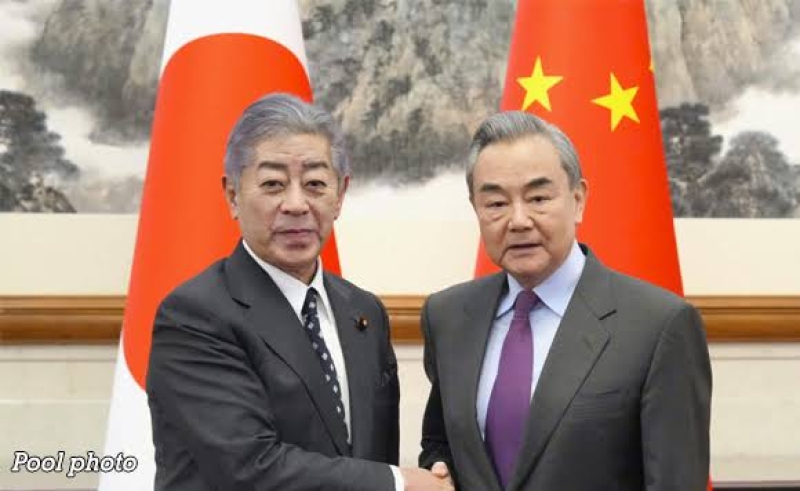- CA Yunus pays homage to Liberation War martyrs on Victory Day |
- Bangladesh capital market extends losing streak for second day |
- Bangladesh celebrates Victory Day Tuesday |
- 'Different govts presented history based on their own ideologies': JU VC |
China, Japan foreign ministers agree on visit, security talks

Talks between China and Japan's foreign ministers in Beijing have paved way for Japan to host China's foreign affairs chief next year, and mutual agreement to hold a security dialog as soon as possible, Japan said on Wednesday.
No details were given for when the events will take place but Japan's Takeshi Iwaya told reporters after his meeting and a working lunch with Chinese counterpart Wang Yi that both agreed on continued high-level talks, including potentially an economic dialog during the 2025 visit.
The one-day visit is Iwaya's first to the Chinese capital since becoming Japan's foreign minister in October, to discuss thorny issues with his country's largest trading partner.
It follows an agreement between leaders of both countries to work towards a mutually beneficial strategic relationship.
Ties between the neighbors -- trade partners with close economic and investment ties but rivals in security and territorial claims -- are complicated with long-standing geopolitical disagreements and historical wartime sensitivities, reports VOA.
Iwaya raised several security concerns, urging China to take "necessary action" including removing a buoy Japan had identified and believe was installed by China in the exclusive economic zone near one of Japan's southernmost islands.
"I also expressed my serious concerns about the situation in the East China Sea...and the increasing activity of the Chinese military," he said.
On regional concerns, Wang and Iwaya discussed North Korea.
Iwaya sought for China to partake in "a responsible role in maintaining peace and security in the international community," he said.
Japan has expressed "grave concern" over North Korea's security alliance with Russia, in which North Korea stands to gain advanced military technology and combat experience.
Wang stressed in the meeting that the significance of the countries' relationship went beyond bilateral ties.
"If China-Japan relations are stable, Asia will be more stable," Wang said at the start of their meeting.
Visa rules and seafood ban
In reciprocity to China's eased visa rules, Japan will remove some requirements for three-year multiple entry tourist visas for Chinese citizens and allow those on group visas to stay up to 30 days, an increase from the previous 15.
The country also has introduced a new 10-year multiple entry tourist visa.
Last month, Beijing expanded its visa-free arrangements to include Japan until the end of 2025, restoring a policy that was suspended during the pandemic.
China also extended the stay period to 30 days from 15. Japanese citizens were able to enter China without a visa for up to 14 days before COVID-19.
Iwaya pointed out that addressing the safety and security of Japanese nationals was important to increase travel between Japan and China.
Cases of Japanese nationals detained under China's anti-espionage law and the lack of transparency around the law have led to Japanese people feeling hesitant about traveling to China, Iwaya said, calling for more transparency and the release of those detained.
Their discussion of China's ban on Japanese seafood, highly expected on the agenda, did not indicate any easing on restrictions, but only that both sides agreed to "properly implement" a recent agreement.
A major sticking point in bilateral ties has been Japan's discharge of treated radioactive wastewater from the wrecked Fukushima nuclear plant that Beijing strongly opposed and responded to by tightening inspections on Japanese goods.
China was Japan's largest export market for aquatic products until Beijing fully banned them in protest against Tokyo's actions.
Both governments reached an agreement in September that obligates Japan to set up a long-term international monitoring arrangement allowing stakeholders such as China to conduct independent sampling of the treated water.
That was expected to restart the imports but China still wants reassurances from Tokyo that it would fulfill its commitment before "adjusting relevant measures" and gradually restore imports that meet standards and regulations.
However, both countries were ready to restart talks on resuming Japanese beef and rice imports.

